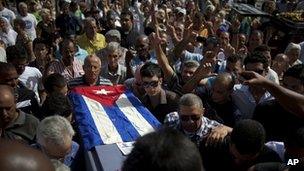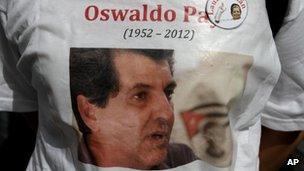Police free Cubans detained at Oswaldo Paya's funeral
- Published

Oswaldo Paya's funeral drew a crowd of people
Police in Cuba have freed a group of dissidents they had arrested on Tuesday at the funeral of the prominent activist Oswaldo Paya.
Pressure group the Cuban Commission for Human Rights and National Reconciliation said most of those arrested had been freed, but the group did not give exact numbers.
The dissidents were picked up for questioning by police after shouting slogans against the government.
Mr Paya died in a car crash on Sunday.
His son, who is also called Oswaldo, suspects the car may have been forced off the road.
Mr Paya alleges that two survivors of the crash said they had been forced off the road by a truck that rammed their car repeatedly.
Cuban officials say the driver, a Spanish national, lost control and hit a tree.
Diplomats have told Reuters news agency there is no evidence to back Mr Paya's allegations and that they believe it was a genuine accident.
<bold>US criticism</bold>
The dissidents were arrested as they were leaving the church where Oswaldo Paya's funeral service had been held.

Friends and family wore T-shirts with Mr Paya's photograph at his funeral in Havana
One of those detained, Guillermo Farinas, told AFP news agency he had been struck in the face and forced onto a bus which took him and other activists to a police barracks.
"I was arrested for about nine hours at the Tarara police school (in eastern Havana) with about 20 other dissidents." Mr Farinas said.
Mr Farinas is known for staging hunger strikes that drew attention to the plight of political prisoners in Cuba.
In 2010 he was awarded the Sakharov Prize, the European Union's human rights award, which had gone to Mr Paya in 2002.
The United States has condemned Tuesday's arrests.
In a statement, White House spokesman Jay Carney said it was "a stark demonstration of the climate of repression in Cuba".
"We call on the Cuban government to respect internationally recognised fundamental freedoms, including freedom of speech, rather than arresting their citizens for peacefully exercising these universal rights that are protected and promoted by governments throughout the world," Mr Carney wrote.
<bold>'Tireless champion'</bold>
On Monday, US President Barack Obama had sent his condolences to Mr Paya's family, calling him "a tireless champion for greater civic and human rights in Cuba".
Mr Paya, 60, is best-known as the founder of the Varela project, a campaign begun in 1998 to gather signatures in support of a referendum on laws guaranteeing civil rights.
In May 2002, he presented Cuba's National Assembly with a petition of more than 10,000 signatures calling for an end to four decades of one-party rule.
The Cuban government described Mr Paya as an agent of the US who was working to undermine the country's revolution.
But the anti-Castro opposition in the US criticised him for being too moderate.